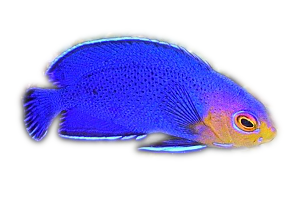
By Bob Goemans

Likely Reef Tank Suitable
Likely Fish-Only Tank Suitable
Range: Indo-West Pacific Ocean: Philippines, Bali, and Indonesia.
Size: 3 inches (6 cm)
Natural Environment: Inhabits sandy bottom areas on deep coastal slopes and sand flats where it lives in association with Alpheus randalli and usually found at depths between 50 to 85 feet (15 – 25 m) where it feeds on tiny benthic invertebrates and zooplankton.
General Husbandry: Occasionally seen in the trade having a whitish body with several slanted brown body bars, some yellow on the forehead and a long first ray on the front dorsal fin that is edged in black.
Can be maintained in reef or fish-only aquariums having some rocky crevices for hiding, a sandbed of at least two inches (5 cm) in depth to create its burrow and peaceful tankmates so it can feed without being interfered with when feeding time arrives.
Should not be housed with aggressive fishes such as groupers, dottybacks, triggerfishes or aggressive angelfishes.
Requires a meaty diet, i.e., enriched brine shrimp, mysis, finely chopped fish or shrimp flesh, and other various frozen carnivore foods, and fed twice daily.
Small sinking enriched shrimp meal pellets may also help keep it well fed.
Taxonomy:
Order: Perciformes
Suborder: Gobioidei
Family: Gobiidae
Genus: Stonogobiops
FYI: Spends most of its time resting on the substrate.
Experience Level: Intermediate
Temperament: Peaceful
Diet: Carnivore
Coral Safe: Yes
Fish Safe: Yes
Invertebrate Safe: With caution
Acclimation Time: 30 minutes+
Aquarium Environment: Reef or fish-only aquarium
Tankmates: Peaceful
Minimum Tank Size: 20 gallons
Temperature Range: 72 - 82°F (22 – 27°C)
Specific Gravity: 1.020 - 1.026
pH: 8.0 - 8.5
.jpg)